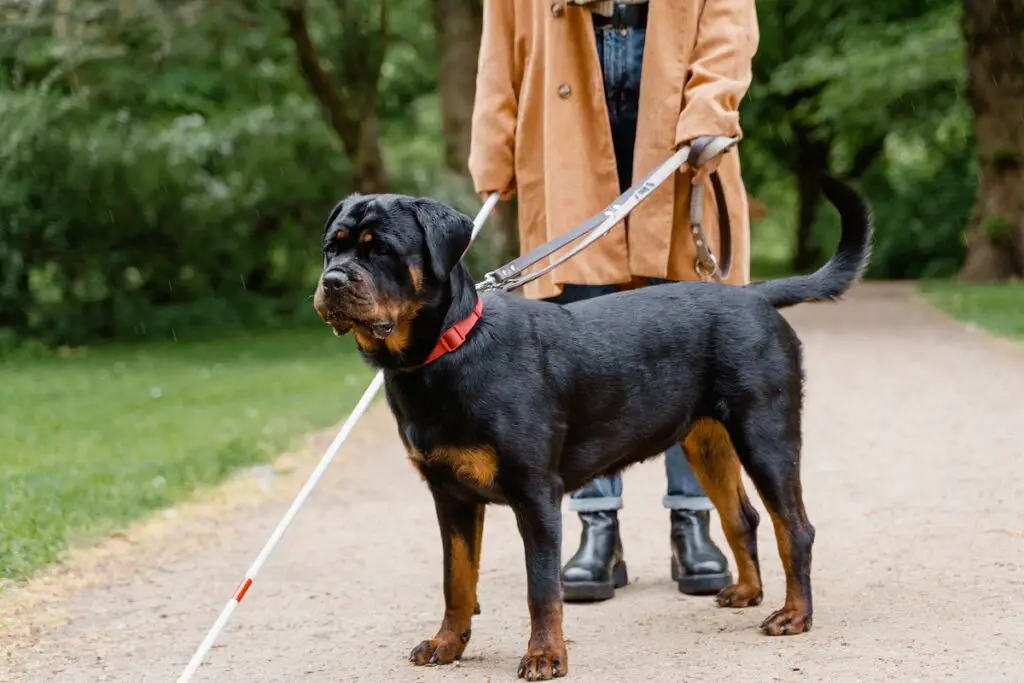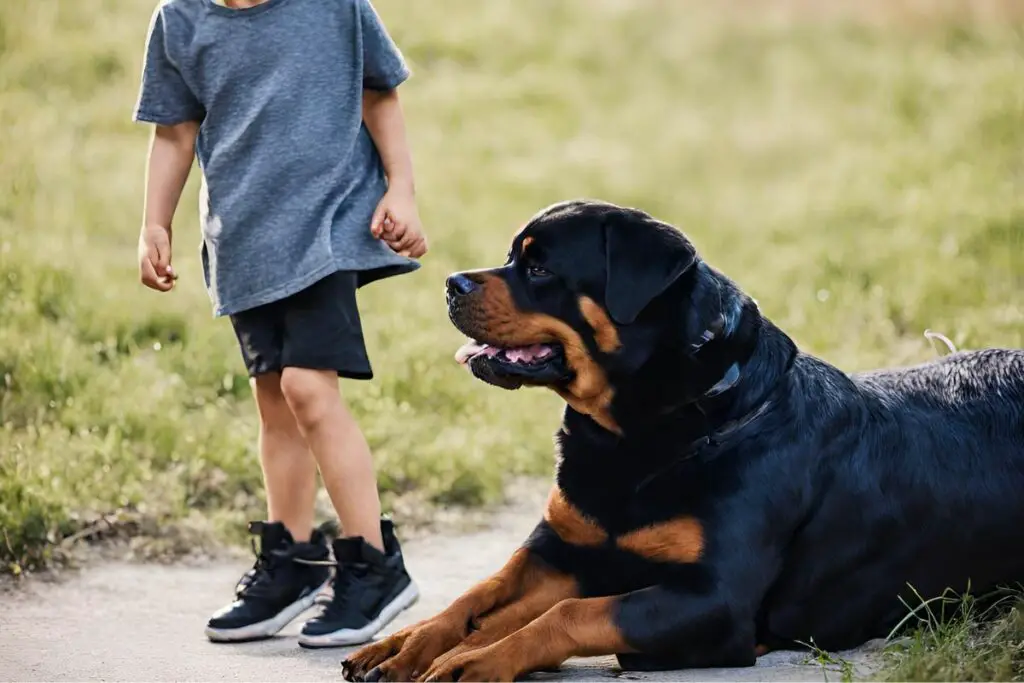Rottweilers: loyal protectors or ticking time bombs? Their powerful build and imposing presence inspire both admiration and apprehension, leaving many wondering if they’re truly suitable for family life. This often-misunderstood breed can be a loving companion, but responsible ownership is paramount. Understanding their temperament, training needs, and potential challenges is crucial. This article explores the realities of Rottweiler ownership, providing you with the essential information needed to decide if this powerful breed is the right fit for your family.
Dogs have long been celebrated as man’s best friend, offering companionship, security, and unwavering loyalty. However, when selecting the ideal family dog, it’s important to carefully consider all options to ensure you find the perfect companion for your children.
The Rottweiler, known for its muscular build and formidable appearance, often raises questions about its suitability as a good family dog. The truth is, with the right training, socialization, and care, Rottweilers can be exceptional additions to your household, known for their loyalty, affection, and tranquil nature.
In this guide, we’ll delve into the specific needs and temperament of Rottweilers, helping you understand if this breed is the ideal match for your home.
Are Rottweilers Good Family Dogs
Rottweilers are not just strong and loyal; they are also surprisingly gentle, especially when properly trained. This makes them great for families, even those with small children. They’re known for their protective nature, often watching over babies and alerting parents if something seems amiss. Rottweilers are smart, too, able to learn many commands and respond quickly.
Despite their size, Rottweilers need regular exercise and love to play games like fetch. They’re large and powerful, which can make them look intimidating, a trait that also makes them effective guard dogs. Historically, their strength and smarts have even led to roles in police and military services.
Rottweiler Temperament & Characteristics
Below is a concise summary of the breed traits and characteristics of Rottweilers.
| Group | Working |
| Height | 22 – 27 inches |
| Weight | 80 – 135 pounds |
| Coat | Smooth/short in black & rust, black & mahogany, black & tan |
| Temperament | Loyal/loving /confident guardian |
| Lifespan | 9 – 10 years |
Rottweiler’s Personality
Rottweilers come in various temperaments, depending on their breeding line. It’s crucial to understand your needs and ask the right questions when choosing a Rottweiler to avoid getting one that’s too challenging to handle.
Originally bred as working dogs for farmers and butchers, Rottweilers have a natural instinct to guard and protect, which sometimes leads to them being unfairly labeled as aggressive. In reality, they can be playful, gentle, and extremely loyal to their family or ‘pack.’
These dogs are intelligent and quick learners, making them suitable for roles like service or police work.
They are best suited for experienced owners who understand training and handling, as this helps in developing them into well-behaved pets. While most Rottweilers are calm and friendly, some are bred to be more assertive, especially for guarding purposes. It’s important to inform the breeder if you’re looking for a family-friendly pet.
However, Rottweilers do need a lot of attention and interaction with their humans to stay happy and well-behaved. They thrive with a firm, consistent leader who can offer both discipline and rewards.
It’s important to note that while they are protective, Rottweilers aren’t the best choice if you’re looking for an aggressive guard dog. They tend to act out of fear rather than aggression, which isn’t ideal for this breed. Regular contact and exercise help maintain their calm and stable temperament, making them a devoted and loving part of the family.
Rottweiler’s Behavior with Other Kids
The Rottweiler forms a deep bond with its family, including children. Raised alongside kids, a Rottweiler puppy becomes a loyal and protective companion. These dogs are patient around children and usually have a gentle nature.
They tend not to bark or growl at little ones and often display more playfulness than aggression. However, it’s crucial to socialize Rottweilers from a young age, involving them in puppy training classes and exposing them to various people and environments.
Be prepared for some drooling and slobbering with Rottweilers, and keep water handy. An active household with kids and other pets suits a Rottweiler well. They enjoy being part of family activities and view children as members of their pack, often taking on a protective role.
Rottweilers love playtime with kids but may not immediately warm up to unfamiliar children. They can be cautious around strangers and may act protectively if they perceive their ‘children’ are in danger.
It’s important to supervise a Rottweiler around children until it is fully trained and socialized. If not accustomed to kids from puppyhood, a Rottweiler may struggle to adapt to a family setting and could potentially react negatively if feeling threatened by a child.
Rottweiler’s Behavior with Other Pets
Early socialization is key for a Rottweiler to coexist peacefully with other pets. If introduced to other animals from a young age, a Rottweiler can adapt well, making future introductions to new pets much smoother.
Rottweiler puppies, known for their rapid growth, may not always be aware of their own size and strength. Therefore, supervising play sessions with multiple pets is essential until you’re confident that they have comfortably adjusted to each other.
Rottweilers are not typically a breed that readily engages in play or interaction with unfamiliar dogs, so gradual and controlled introductions are important for fostering positive relationships.
Moreover, Rottweiler dogs have a natural tendency to chase cats that wander into their territory and may show aggression towards other dogs of the same sex, especially when out on walks. Therefore, keeping them leashed in public is crucial for everyone’s safety.
Additionally, having other pets in the family can help mitigate any aggressive tendencies a Rottie might exhibit when left alone at home.
How to Train a Rottweiler to be an Ideal Family Dog?
Rottweilers are naturally territorial, making early training crucial for manageable behavior. Ensure your Rottweiler has plenty of opportunities to expend energy, like visits to a dog park or backyard playtime, to maintain calmness indoors.
Training your Rottie to avoid jumping on people is important. Train them not to jump up and use positive reinforcement by praising them when they refrain. Keep training sessions brief to hold their interest; a few minutes each time is sufficient.
Avoid playing tug of war with Rottweilers, as this game can be overly stimulating, and they might struggle with the concept of losing. Instead, focus on activities that don’t encourage overly dominant behavior.
Always attend to your Rottweiler’s basic needs first, such as providing adequate dog food and fresh water, especially after training sessions. A lack of these essentials can lead to a refusal to participate in further training.
It’s also important not to engage in rough play with your Rottweiler. Such play can send mixed signals about dominance and control.
Remember, Rottweilers benefit from outdoor time for their mental well-being. Dogs are social animals and enjoy interactions beyond their immediate family. Dog parks can be great for this, allowing them to socialize with other dogs and people. Always reward good behavior with treats or praise, reinforcing positive actions rather than negative ones.
Conclusion
Rottweilers, with their distinctive temperament, are more than just powerful guard dogs; they are also one of the most loyal large dog breeds, thriving in environments where they are treated as integral family members.
These dogs need ample space to play and exercise, making a home with a secure, spacious outdoor area ideal. This is crucial because in confined spaces, or when deprived of sufficient human interaction and guidance, a Rottweiler can easily become bored, leading to potential behavior issues.
Known for their affectionate nature, Rottweilers cherish time spent with their family. They are not the type to handle solitude well, preferring instead to be in the same room with their loved ones.
Despite their imposing size, they have a surprisingly gentle side, often seeking cuddles in your lap or contentedly leaning against your leg. Their ability to balance the roles of a protective guard dog and a good family pet makes them a unique and rewarding addition to any household.
Ultimately, Rottweilers can be excellent family dogs, but it’s not a decision to take lightly. Their protective instincts, strength, and need for consistent training require experienced owners committed to socialization and firm, positive reinforcement. While their loyalty and affection are undeniable, potential owners must honestly assess their lifestyle, experience, and ability to provide the necessary time, training, and resources a Rottweiler needs to thrive. In the right hands, a Rottweiler can be a loving and devoted companion, but a mismatch can lead to behavioral issues and unhappy outcomes for both the dog and the family.







